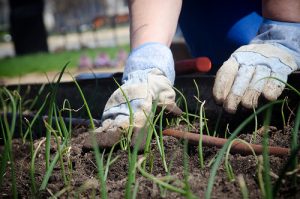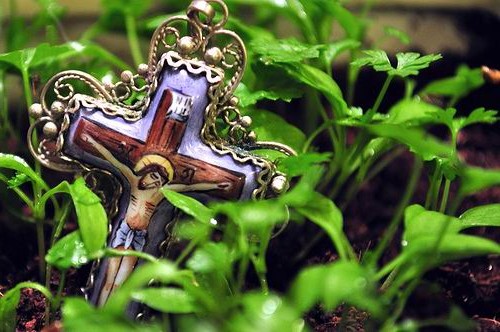Sixth Sunday after Epiphany, Year A, February 12, 2017
Lessons: Deuteronomy 30:15-20, Psalm 119:1-8, 1 Corinthians 3:1-9, Matthew 5:21-37
Theme: God’s faithful and generous people are workers in God’s garden of this world, tending, cultivating, and equipping one another for growth and life.
Key Scripture: The one who plants and the one who waters have a common purpose, and each will receive wages according to the labor of each. For we are God’s servants, working together; you are God’s field, God’s building. 1 Corinthians 3:8-9
Preaching/Teaching Reflection
They’re becoming a more common sight: From Sheyenne, North Dakota, to Detroit, Michigan, and from Mechanicsburg, Pennsylvania, to Los Angeles, California, plots of previously unused or abandoned land are turned into lush gardens bearing an abundance of fruits and vegetables. The wonderful thing about these gardens is that they are a communal effort. For minimal cost, people who otherwise might not have space or knowledge about how to grow their own food are combining efforts to  learn, tend, and harvest a variety of healthy produce. In addition to improving their diets and decreasing what must be purchased, these gardeners share information, skills, tools, and form strong community bonds around this common purpose.
learn, tend, and harvest a variety of healthy produce. In addition to improving their diets and decreasing what must be purchased, these gardeners share information, skills, tools, and form strong community bonds around this common purpose.
In this week’s epistle reading Paul has a thing or two to say about community gardening. Of course, he’s talking about “soul food” and cultivating faithful disciples, and not comparing kale and collards or considering the benefits and hindrances of organic growth versus integrated pest management. Nonetheless, vegetable gardening and spiritual sowing have quite a bit in common.
In community gardens, success is proportionate to the willingness of all participants to “buy into” the program. Folks invest time, energy, and resources into every aspect, from tilling the soil to weeding and fertilizing, and to harvesting the fruits and vegetables at the correct times to ensure the highest possible yield and the best stewardship of each precious plant. Even so, the gardeners themselves do not completely control the end result.
The church functions in much the same way, as Paul points out, saying “I planted, Apollos watered, but God gave the growth” (1 Corinthians 3:6). The faithful “gardeners” are fully engaged in the work of cultivating disciples, but God provides the sun (or in this case, the Son) and rain and good conditions for the fledgling sprouts to grow into faithful maturity.
Faith gardening is risky business over which we good church folk have precious little control over outcome. And yet, we still worry and fret as if we do have control. In fact, we often worry so much about the weeds that we forget to pull them. We fret over the lack of growth, even though we know it’s impossible to watch most plants grow before our eyes. Yes, we fret about the troublesome events and trends in our faith gardens and we lament the lack of growth and failure to thrive, but at the same  time, we fail to give glory and honor to the source of all life and growth. We fail to trust the master gardener to bring about the growth and maturity we so desperately crave for our precious plots. Have you ever, for example, watched a faith community resist moving to a better location even though the leaders know that a new site will get more light and generate lush growth?
time, we fail to give glory and honor to the source of all life and growth. We fail to trust the master gardener to bring about the growth and maturity we so desperately crave for our precious plots. Have you ever, for example, watched a faith community resist moving to a better location even though the leaders know that a new site will get more light and generate lush growth?
Our individual and corporate faith development and community growth depend on our willingness to let God control our plans and direction. How faithfully we produce and the results we yield depend on our ability to hear and heed Jesus’ call and words of instruction. We have choice. We can plant or we can piddle around. We can water and fertilize, or we can ignore what’s been planted and let it wither. We can be part of a flourishing and fertile community garden, or we can opt out of life together and miss out on the blessings and abundance of God’s harvest. So, what will you choose this day: Will it be life and prosperity or death and adversity?
In Worship
Addressing the Deuteronomy text, what does it mean to “choose life” in a time when it seems that the church is out of the cultural loop? How do we share the good news in a context that is regularly indifferent and occasionally outright hostile to our efforts? Maybe this is a good time of year to initiate a “Choose Life” project in your community, identifying healthy life-giving practices of eating well, exercise, and spiritual growth and discipline. If you start now, engaging leaders and planning programs, you’ll be just in time to use this as a Lenten focus. We are called to be a counter-cultural people, and “choosing life” means following and loving God, and loving neighbor as self. In order to accomplish these things, we must love ourselves enough to choose healthy and whole practices. God does give the growth when we plant and water. How can your congregation begin or augment a healthy life initiative for mind, body, and spirit?
With Youth
Jesus’ words from Matthew’s gospel this week are tough ones to tackle, but they can lead to some rich conversation with youth. What does it mean to do “just enough” to fulfill the letter of the law? In school, that might mean doing the minimum to skate by, to fulfill the requirement but not go the extra mile to learn and grow. For Jesus, the religious folk of the day were all about meeting the requirements, but they didn’t dig deeper to get to the “why” of the requirements and to learn how the law gives life. He uses the formula “You have heard that it was said…” and then adds “but I say to you…” Jesus asks us to go deeper and focus on what really matters and on why it matters. Consider asking the youth to tackle some of the issues Jesus addresses and then invite them to think of additional ones. What does this mean for their spiritual growth, for their Christian witness, and for how they can share real life with the world?
With Children
Growing in Faith
For this illustration, you will need a bag of carrots, a package of carrot seeds, and a jar of carrot baby food. You might also have a simple story Bible, a study Bible and a Greek New Testament on hand Ask the children what all these “carrot” things have in common. Of course, the answer is carrots. But we don’t eat carrot seeds, do we? No, we plant them, tend them, water them, feed them, and help them to grow so that we can eat them. Can babies eat the carrots from our garden? No, of course not. That’s why we cook, puree, and fix carrot baby food for them. They still get all the goodness and benefit of the vitamin A and nutrients, but they get it in a form they can use and digest. We, on the other hand, can eat our carrots raw, cooked, or in recipes–like carrot cake (yum!) with cream cheese frosting.
Paul talks about these important distinctions to the Corinthian Christians. We need to have food appropriate to our faith levels, too. That’s why we have simple story Bibles. Later on we use study Bibles. Pastors often use Bibles printed in Hebrew, Greek, or Latin for in-depth study. We grow in faith just as carrot seeds grow to become food for babies and children and adults. God gives the growth. We help by tending, watering, feeding, and harvesting. God gives the faith growth, too. We help by worshiping, learning, and sharing our faith. Invite the children to help you finish with a “popcorn prayer.” Let each child have a turn making a prayer request. If they can’t think of anything have them simply say “Thank you, Jesus!” Finish with a blessing.
Weekly Stewardship Bulletin Insert
This week’s lesson from 1 Corinthians helps us understand our mutual work together in God’s “garden” (the church). Not only are we called to help equip one another to grow into spiritual maturity, we are also called to reap a harvest so that others may share in the Good News of Jesus. Like gardening, growth in faith, whole life stewardship, and deep discipleship are all part of an ongoing process—not a once-and-done proposition. Take heart in this reality and practice the faith basics of worship, prayer, study of scripture, developing deep relationships, service, and generosity. You may be amazed at the bountiful harvest God grows in your life.
Stewardship at Home
God’s law and Jesus’ teaching are created for our good and for our flourishing. This week at home study the Old Testament lesson (Deuteronomy 30:15-20). Each day consider what it means to “choose life” in a world that thrives on death and destruction. Pick one of the five faith basics mentioned in the Weekly Stewardship Bulletin Insert and focus on that practice each day. If it’s prayer, consider ways to deepen and strengthen your prayer life. If it’s relationship building, find one thing to do each day that will let someone you choose know how much you value them and your relationship with them.
If you have children at home, make “faith” valentines this year to share with others. Cut out paper hearts and write verses of scripture from this week’s Lectionary lessons (and other favorite passages!) on them. On the other side of the heart write a simple note of care and affection. Give them to those you value, perhaps some of the “senior saints” or staff in your congregation.
Photos: Roxanne Ready, Lance Cheung, and may2, Creative Commons. Thanks!
Note: Reprint rights granted to congregations and other church organizations for local, nonprofit use. Just include this note: “Copyright (c) 2017, Rev. Sharron Blezard. Used by Permission.” Other uses, please inquire: thewritelife@hotmail.com.




Leave a Reply